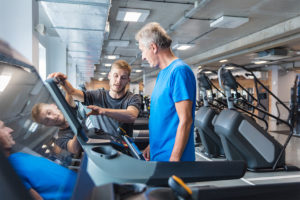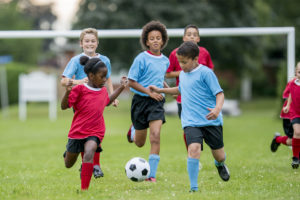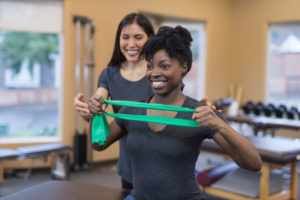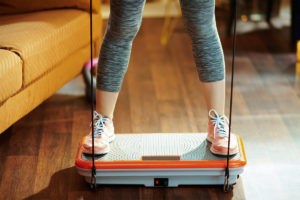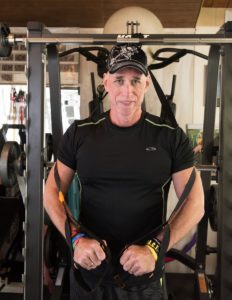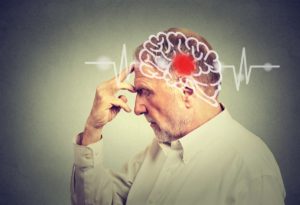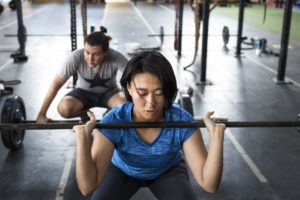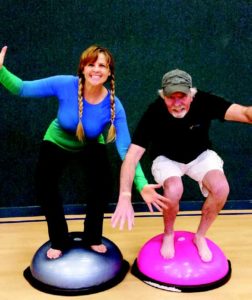Postrehab
Faster Walking After a Stroke
If you work with stroke survivors, speed walking after a stroke will help them get a step ahead in their cognitive fitness.
Concussion Recovery in Young Athletes
Research shares important information about mental health and concussion recovery in young athletes using assessments and interventions.
Stroke Recovery Training
Although many trainers may believe that ongoing stroke recovery is either the sole purview of physical therapists or limited to those so infirmed that progress is limited, there is an incredible opportunity to make a profound difference to survivors.
Vibration Training Improves Strength in Stroke Survivors
Fitness professionals who incorporate vibration training into their programs may have value for those coping with stroke.
Jump for Effectiveness
By analyzing ground-force patterns after subjects jumped as high as possible, researchers devised a simple method of evaluating training or rehab progress.
Eccentric Training Lacks Uniform Strategies
Chances are you’re using eccentric training to improve muscular strength and power, and build lean mass. But are you measuring its effectiveness?
Too Little Or Too Much Sleep Poses Health Risks
National University College of Medicine in South Korea warns that sleeping more than 10 hours a night might be worse.
Pilates for Recreational Athletes
Professional athletes of all kinds have discovered that adding Pilates to their training can improve performance, reduce injury, speed recovery, and help their hardworking bodies stay balanced and healthy (Caple 2016; Knowlton 2016; Saxon 2016). Pilates—a whole-body exercise system that can help you develop strength, functional flexibility, coordination and balance—can offer those same benefits to recreational athletes. A well-rounded program, particularly one offered in a fully equipped Pilates studio, can do wonders for athletes of almost any age, ability or sport.
Best Foot Forward
A challenging beginning. Ezra didn’t have an easy start. Born with club feet—a congenital condition in which the foot is twisted out of shape or position—he had his first surgery shortly after birth and spent the first few years of life sleeping with corrective boots.
The Achilles Tendon
Many fitness professionals have dealt with an Achilles tendon injury, either their own or a client’s. The largest and strongest tendon in the body, the Achilles connects the lower-leg muscles and calf to the heel. “Synchronous functioning” of the tendon and calf is crucial for many activities, including standing on tiptoe, running, jumping and climbing stairs (Bhimji 2016).
Dutch surgeon Philip Verheyen named the tendon (after the Greek hero Achilles) in 1693. Previously, it was known as “tendo magnus of Hippocrates” (van Dijk 2011).
When the Client Is You
client: Frank | personal trainer: Frank McKenna, MEd, owner, Beach Better Bodies | location: Virginia Beach, Virginia
A dire situation. In the summer of 2016, personal trainer Frank McKenna received news he never expected to hear. At age 56, he had recently completed his own physical transformation and was arguably in tiptop shape, so when his doctor told him he had stage 4 lung cancer, he was stunned.
The Anatomy of Functional Training Risks
Many clients can’t seem to get enough of workouts that meld functional movements with high-intensity resistance training. Indeed, workouts using dynamic, high-intensity, full-body movements are great for strength and health—provided the body functions properly and exercisers use correct technique.
Why Proper Rib-Cage Position Is Important
Proper thoracic-cage functioning sets the groundwork for healthy movement.
From Stroke to Strength
It’s not often that a personal training client’s initial screening reads “blocked cranial arteries in the left hemisphere, 1 billion destroyed brain cells, inability to speak, and paralysis and loss of feeling in both right limbs.”
The Joy of Movement Rings True
There's nothing like post–knee surgery downtime to catch up on my IDEA Fitness Journal reading. The February 2017 issue is just chock‐a‐block full of delectable goodness. In particular, I enjoyed Ryan Halvorson's article "Embracing the Joy of Movement" and Kelly McGonigal's "Ready to Love Your Stress?" Even after 38 years as a fitness pro, I learn something every issue to help me improve as a group fitness leader and baby boomer specialist. Both articles made their points logically, succinctly and persuasively.
The “New” Knee Ligament, Rediscovered
Hasn't the knee been thoroughly mapped? Perhaps. However, the following bold headline reverberated throughout the allied health community in 2013: "Doctors Identify a New Knee Ligament."
Really?
Tai Chi, PTSD and Veterans
Tai chi practice may help veterans with posttraumatic stress disorder to manage symptoms like instrusive thoughts, concentration difficulties and psychological arousal. Boston University Medical Center researchers conducted a small pilot study with 17 veterans with PTSD to
evaluate whether tai chi would be a feasible and beneficial activity.
Weightlifting Helps Breast Cancer Survivors
According to Lynn Panton, PhD, professor of exercise science at Florida State University, breast cancer survivors are often discouraged from lifting weights after treatment, for fear it could cause lymphedema, or swelling of the arms and/or legs. Panton, however, facilitated a study that suggests otherwise.
Thriving After a Stroke
client: Gary | personal trainer: Tracy Markley, owner, Tracy's Personal Training | location: Florence, Oregon
Surviving a stroke. In May 2014, 65–yearold Gary had a stroke so severe his doctors were skeptical he'd survive it. Fortunately they were wrong, but he suffered so much damage that physical therapists were initially convinced he'd be wheelchair–bound for life.
Music Keeps Cardiac Patients Moving
Walk into most fitness facilities and you’ll likely hear some sort of music playing. Could that music be what motivates people to move more? For a group of cardiac rehabilitation patients, that was indeed the case.
